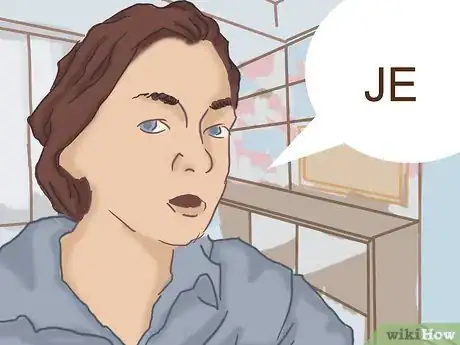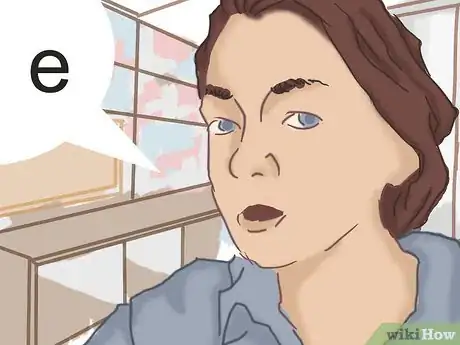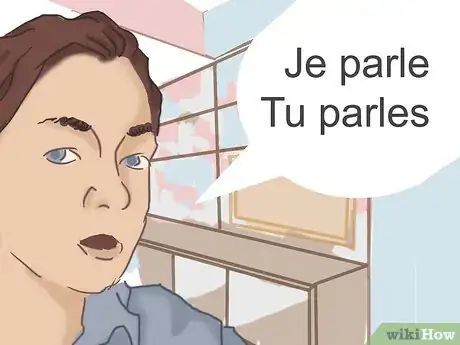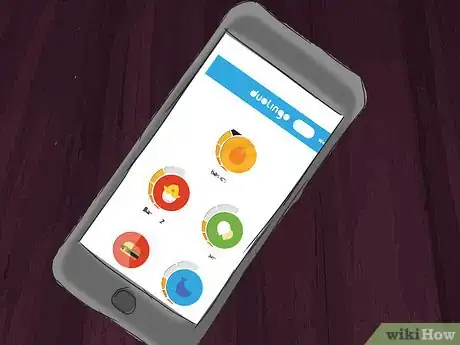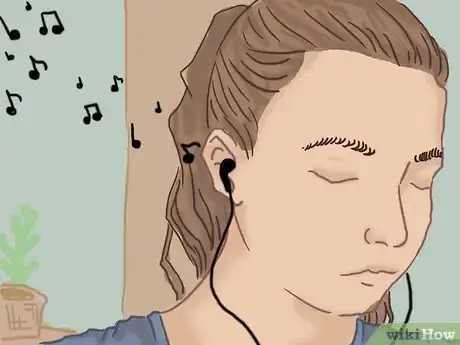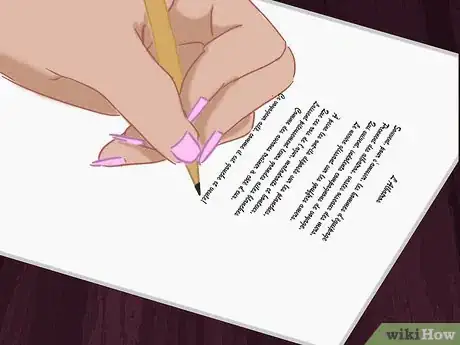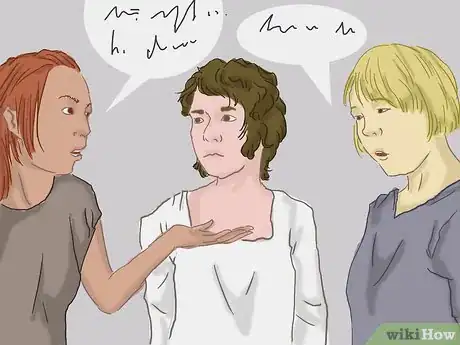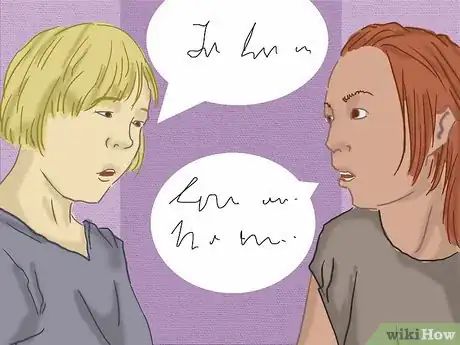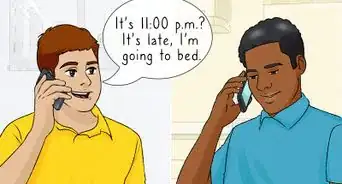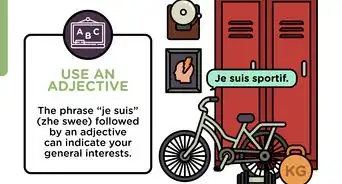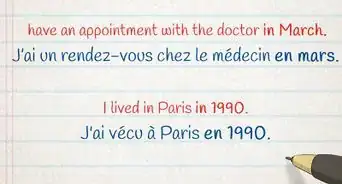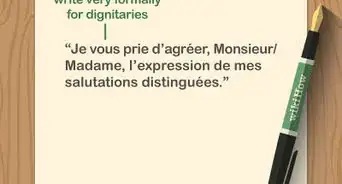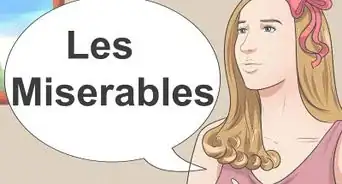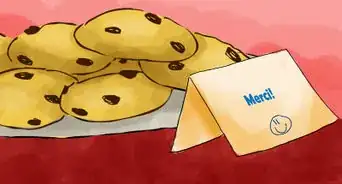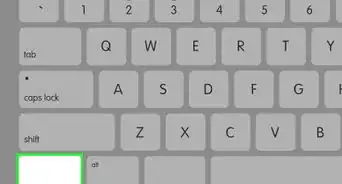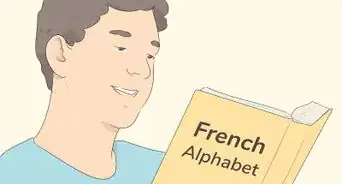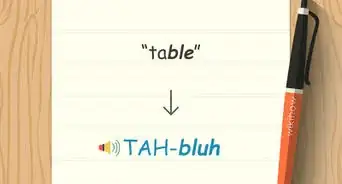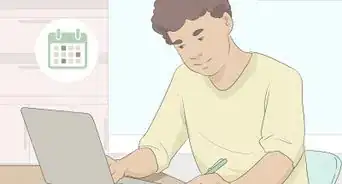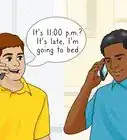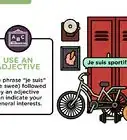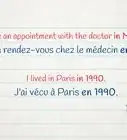This article was co-authored by Lorenzo Garriga. Lorenzo is a native French speaker and French language connoisseur. He has many years of experience as a translator, writer and reviewer. He is also a composer, pianist, and globe-trotter, who has been travelling the world on a shoestring for almost 30 years with a backpack.
There are 21 references cited in this article, which can be found at the bottom of the page.
wikiHow marks an article as reader-approved once it receives enough positive feedback. In this case, several readers have written to tell us that this article was helpful to them, earning it our reader-approved status.
This article has been viewed 84,901 times.
In today's global economy, learning French can yield multiple cultural and economic benefits. Whether you want to read classic novels like Madam Bovary or Les Miserables in their original language or expand your on-line business to European customers, being able to read French can help enrich your life. While it might seem like a daunting task at first, reading another language can help strengthen your general cognitive skills and improve your appreciation for French culture.[1]
Steps
Beginning to Read French
-
1Read like you are a child. If you are completely new to French, then you will need to start at the beginning -- as you did with your native language. Learn how to read simple vocabulary, such as pronouns, colors, days of the week and numbers.[2]
- Pronouns are especially important because they will determine how you conjugate verbs. In French, first person pronouns are je (for "I") and nous (for "we"). Second person words for "you," are tu and vous. Third person pronouns are il, elle, on, ils, elles (he, she, it, they).[3]
- Find children's books and elementary school textbooks and worksheets in order to help you. This might feel somewhat clunky and awkward, but it will help you lay a strong foundation for more advanced reading.
- Charles Perrault's Fairy Tales will be a good text to start with; you are most likely already familiar with the content of the stories in your native language, so you will already have a point of reference to guide you through the language.
-
2Master basic pronunciations of French. While you may plan to primarily read in French, as opposed to speaking it conversationally, you should have an understanding of the verbal rhythms of the language. Here are some important pronunciations to learn as you read French aloud:[4]
- Pronounce “e” as though you would pronounce the “a” in “about.”
- Change the “e” with a forward accent to “ay,” as in “pay.”
- Change the “e” with a backwards accent or an umlaut to “eh,” like when you say “set.”
- Pronounce “a,” with or without an accent” like the “a” in “father.”
- Pronounce “ou” as the “ooo” in “food.”
- Pronounce “au,” “o” and “eau” as the “oa” in “boat.”
- Pronounce the “u” by placing the tongue behind the bottom of the back teeth and saying “ooo” as in “food.”
- Pronounce “y” as “ee,” as in “seed.”[5]
Advertisement -
3Learn verbs and how to conjugate them. Conjugations of active verbs in French are a little more complicated than in English. Just try to get a sense of the general patterns of conjugations for each pronoun. Many verbs in French end in -er, -ir, and -re letters.
- Conjugating -ER verbs. For words that end in ER, here is how you would conjugate them according to their pronoun. Ex: parler (to speak). Je parle, Tu parles, Il/Elle parle, Nous parlons, Vous parlez, Ils/elles parlent.[6]
- Conjugating -IR verbs. Example: finir (to finish). Je finis, Tu finis, Il/Elle finit, Nous finissons, Vous finissez, Ils/Elles finissent.[7]
- Conjugating -RE verbs. Example: entendre (to hear). J'entends, Tu entends, Il/Elle entend, Nous entendons, Vous entendez, Ils/Elles entendent.[8]
-
4Purchase an English to French dictionary. The dictionary will help you not only learn more vocabulary words, but it will also give you a guide for conjugating verbs and constructing simple sentences. A short dictionary is fine for basic vocabulary, but if you want to read the classics, you will want a more thorough dictionary. The Oxford-Hachette French dictionary is considered a standard reference text.[9]
- Although you will find a dictionary to be a critical tool in helping you learn French, you should try to read for your own, independent comprehension. Before you look a word up in the dictionary, try to see if you can understand the general meaning of a sentence from contextual clues, such as helpful images that describe the sentence (as in children's books).
-
5Read French comic books. You might find children's books to be too boring or silly to capture your sustained interest. Research has shown that comic books are a successful text for learning a new language, especially if you are an adult learner.[10]
- With their use of visual illustrations, comic books provide a wealth of contextual clues as you are reading. Even if you cannot understand all of the written text, you will have a great chance of understanding its meaning through the pictures.
- Comic books also feature mostly dialogue in their text so you will also gain a sense of how to use French conversationally.
- Comic books have also been shown to increase a reader's vocabulary in the new language even if readers are not attempting to study the language as a whole.[11]
-
6Embrace apps. If you are balancing the demands of work and home life in addition to trying to learn a new language in your free time, an app can fit into your busy schedule. Many students have reported that language learning apps have helped them adopt a new language.[12]
- Studies have also shown that using an app gives learners a greater sense of control and autonomy over their new language.
- Some popular apps for learning include Duolingo, Keewords, and BBC Languages. These apps don't simply translate words for you; they can also let you play games, use flash cards, take quizzes, and watch videos in order to test your language skills.
-
7Incorporate French into your daily routine. Once you have mastered the basics of French, try to incorporate it into your daily life. There are many high-quality podcasts that you can listen to that will help you learn French on your daily commute or while you exercise.
- Try listening to French music while you cook or when you are driving. Singing along with the words will help you get accustomed to the language, even if you don't know the full meaning of the words.
Reading French on an Intermediate Level
-
1Write in French. One of the best ways to learn to read French is write it yourself. You will get a better sense of how sentences are constructed and how to interpret meaning from the language.
- Keep a daily journal with simple French sayings in it; you can come up with them yourself, or copy them from famous French writers and thinkers.
- Use you dictionary to help you as you write. Be sure to include new words into each sentence.
- Keeping a diary with also let you see your own progress and give you a greater sense of control over your learning process.[13]
-
2Read French newspapers and blogs. Newspapers will be a great place to start; you will probably be able to understand the more simplistic headlines and then use them to guide your understanding of the articles.
- Popular newspapers in France include L'Express[14] , L'Obs[15] , and the satirical Le Canard enchaîné[16] .
- You should look for blogs that will use recognizable vocabulary, such as cooking blogs. You will be able to easily recognize the general format of the recipes and will be able to focus more on learning the grammatical construction of the sentences.
-
3Watch French films and television shows. Watching French films will help you get a sense of the conversational rhythms of the language.[17]
- Try watching the same film twice: the first time with subtitles, the second time without them. This way, you will know the general plot and content of the film and will be able to translate the French words into your native language.
- You should also try watching the film with the French subtitles on. This will allow you to pair the written words with their spoken counterparts.[18]
- You can find a list of the 100 best French films at Time Out Paris online.
-
4Enroll in a French class in a local college. If you are comfortable reading newspaper articles and blog posts, you might be able to enroll in an intermediate (200 or 300 level) class. The class will ensure that you will continue to practice your French on a daily basis.
- The class will also give you a community of French speakers so you can practice your language more conversationally.
- If you cannot afford to take a local class, try to find a group of French speakers. If you live in a large city, there might be a French Consulate office that you can check for meetings and events.
Understanding Advanced Reading in French
-
1Read novels written in French. One of the most advanced forms of reading you can complete is to read full novels in French. You might be familiar with some of the most famous 19th century novels, like The Hunchback of Notre Dame, but you might be more comfortable with more contemporary novelists, like Muriel Barbary and Laure Alcoba.[19]
- Try to read the full novel without using the dictionary. But as you read, write down any words you don't know in a notebook. After you have finished the novel, you can go back and look up with words that you didn't understand.[20]
-
2Dive into French philosophy. Some of the best texts in modern philosophy have originated in France, from Jacques Rousseau to Jean-Paul Sartre. If you truly want to test your comprehension of the language, try comprehending abstract ideas on the self and society from French philosophy.
- Voltaire was a French philosopher who's fairly easy to read. His famous satirical novel Candide is often taught in beginning "French for reading knowledge" classes.
-
3Book a trip to France. If it is in your budget, take a trip to France to practice your language skills. Nothing can compare to the experience of being immersed in a language.
- You can research French-immersion programs for adults; many are designed specifically for non-native speakers who are planning an extended trip abroad.
- If you do not wish to go to France, you can also look at other French-speaking countries and places such as Belgium, the Seychelles, or the province of Montreal in Canada.
-
4Maintain your new language skills. Being a multi-lingual speaker can have significant benefits for your longterm cognitive skills. Studies have shown that students who speak multiple languages tend to score better on standardized tests and also have a better abilities to memorize lists and sequences.[21]
- Other research has shown that learning other languages could delay the development of degenerative neurological conditions, like Alzheimer's. In one study, participants who knew multiple languages developed Alzheimer's four years after patients who spoke only one language.[22]
Expert Q&A
Did you know you can get expert answers for this article?
Unlock expert answers by supporting wikiHow
-
QuestionHow do I start to learn French?
 Lorenzo GarrigaLorenzo is a native French speaker and French language connoisseur. He has many years of experience as a translator, writer and reviewer. He is also a composer, pianist, and globe-trotter, who has been travelling the world on a shoestring for almost 30 years with a backpack.
Lorenzo GarrigaLorenzo is a native French speaker and French language connoisseur. He has many years of experience as a translator, writer and reviewer. He is also a composer, pianist, and globe-trotter, who has been travelling the world on a shoestring for almost 30 years with a backpack.
French Translator & Native Speaker
-
QuestionWhat does "le petit frere" mean?
 Community Answer"The little brother."
Community Answer"The little brother." -
QuestionWhat does this mean? "Je t'aime avec mon coeur. J'espere que tu m'aimes."
 Community AnswerIt means, "I love you with my heart. I hope that you love me."
Community AnswerIt means, "I love you with my heart. I hope that you love me."
References
- ↑ http://www.sciencedirect.com/science/article/pii/S001002771300228X
- ↑ https://onlinelibrary.wiley.com/doi/abs/10.1111/j.1540-4781.1988.tb04175.x
- ↑ http://www.frenchtutorial.com/en/learn-french/basics/personal_pronouns
- ↑ http://www.europa-pages.com/lessons/french-pronunciation.html
- ↑ http://www.europa-pages.com/lessons/french-pronunciation.html
- ↑ http://www.languageguide.org/french/grammar/conjugations/
- ↑ http://www.languageguide.org/french/grammar/conjugations/irverbs.jsp
- ↑ http://www.languageguide.org/french/grammar/conjugations/reverbs.jsp
- ↑ https://global.oup.com/academic/product/oxford-hachette-french-dictionary-9780198614227?cc=us&lang=en&
- ↑ http://ebooks.cambridge.org/chapter.jsf?bid=CBO9781139524834&cid=CBO9781139524834A021&tabName=Chapter
- ↑ http://www.tandfonline.com/doi/abs/10.1080/09571730802390742
- ↑ http://www.ascilite.org/conferences/Wellington12/2012/images/custom/steel,_caroline_-_fitting_learning.pdf
- ↑ http://www.nflrc.hawaii.edu/rfl/April2002/leung/leung.html
- ↑ http://www.lexpress.fr/
- ↑ http://tempsreel.nouvelobs.com/
- ↑ http://lecanardenchaine.fr/
- ↑ http://onlinelibrary.wiley.com/doi/10.1111/j.1944-9720.1995.tb00773.x/abstract
- ↑ http://search.proquest.com/openview/99aa821597078f520513113ce03fbaaf/1?pq-origsite=gscholar
- ↑ http://www.lextutor.ca/cv/beyond_a_clockwork_orange.html
- ↑ http://journals.cambridge.org/action/displayAbstract?fromPage=online&aid=2300652&fileId=S026144480800520X
- ↑ http://ijb.sagepub.com/content/18/1/35.short?patientinform-links=yes&legid=spijb;18/1/35
- ↑ http://onlinelibrary.wiley.com/doi/10.1002/ana.24158/abstract
